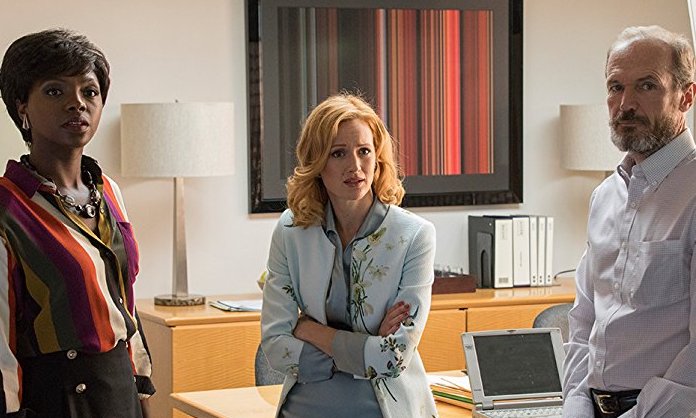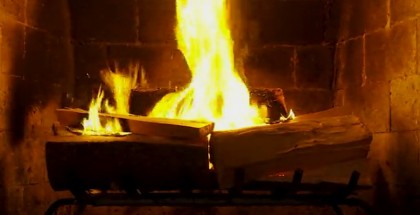UK TV review: Halt and Catch Fire Season 4, Episode 4
Review Overview
Human happiness
9Machine-tooled satisfaction
9David Farnor | On 11, Sep 2017
Warning: This contains spoilers. Not see Episode 3? Read our spoiler-free review of Halt and Catch Fire Season 4’s opening episodes here.
“When you go out that door, I want to see you head in the same damn direction.” That’s Donna (Kerry Bishe) to Tanya (Sasha Morfaw), leader of the Rover team at AGGE. If you were worried that Halt and Catch Fire’s final season would take its time building up the brutal rivalry of Donna’s search engine and Joe (Lee Pace) and Gordon’s (Scoot McNairy) rival, Comet, Episode 4 doesn’t pull any punches: the gloves are off, and Donna’s coming out swinging.
Donna has always been a fiercely independent woman, one who knew she was better than an overlooked house wife, who knew she could match Gordon at engineering, who knew that she didn’t deserve to be weighed down by Joe and Gordon’s games while she was at mutiny – and especially knew that she had no time to be held back by Cameron (Mackenzie Davis). After Episode 3 saw her and Gordon exchange harsh words about the fact that their daughter, Haley (Alana Cavanaugh), was working on Comet, Episode 4 sees her not stop to worry about trampling all over her daughter’s dreams: in the great technology race, there’s no time to stop, only time to improve her algorithm and get to the finish line first.
After four seasons, we’ve seen time and time again how technology is all about timing: too late and Apple ends you before you’ve begun; too slow and AOL and others start their own ISP and leave you hung out to dry. So when Donna, only an episode after she tried to be nice and invite everyone on her team for dinner, immediately reverts back to barking at Bos (Toby Huss) and Tanya to get their skates on, we sympathise with her ruthless determination.
What Episode 4 does brilliantly is it sketches out the sheer contrast between the two contenders’ approaches: while Donna is becoming less personable and insisting that Cecil (poor Cecil) gets the coding sorted, Joe and Gordon are getting friendlier and friendlier with their staff. Because that’s what they need at Comet: the human touch. And so they hire wave of young people to surf the web and write down the sites they stumble upon. The wave of people become groups dedicated to comedy, music and so on, and those groups become teams, racing to see who can index the most pages in a week.
That last part is the brainwave of Katie Herman (Anna Chlumsky), a library nerd whose ontological outlook makes her the ideal person to head up the whole process. She’s eager, geeky, charming, funny, and sparks off Gordon and Joe with the kind of easygoing chemistry that says she’ll be a central part of the company’s success or failure – and perhaps Gordon’s romantic success or failure too. Given how well-honed the ensemble has become over the years, it’s a huge credit to Chlumsky that she can slot in so effortlessly; it says a lot that we genuinely can’t wait to hang out more in Comet’s office in the coming episodes.
Part of the reason Comet’s office is so fun, of course, is Haley, who has wonderfully come into her own this season, as Cavanaugh seizes the opportunity offered by the writers finally working out what to do with Gordon’s daughters. As her team win the weekly index-off and she gets the prize of throwing a custard pie on her dad’s face, it’s impossible not to grin at the joy of it all. Even Gordon and Joe, the world’s best worst couple, are happy to pass on an acquisition offer from AOL, because they’re so content simply shooting a rack of pool and seeing where their venture goes.
Of course, there’s tension there, too, as both Gordon and Joe check out Rover’s search engine to see how their enemy is faring. They don’t grade it very highly, thanks to Cecil (poor Cecil) and his algorithm, which doesn’t deliver very relevant results. Cameron, though, argues that it’s only a few minor tweaks away from truly solving the problem.
Ah, Cameron. How does she fit into all of this? Well, she doesn’t. Not yet. Because with Pilgrim in limbo, she’s now in no man’s land herself, without her game and without Tom and without a sense of belonging anywhere. She’s a bit young for a mid-life crisis, but how fitting that it should take the form of the innocent desire to have a home: upon seeing a sign in the woods advertising a plot of land, she impulsively decides to buy it, parking an Airstream in the middle of the woods and sticking some fairy lights on the outside. It’s both a mature step forward and an immature leap back – perfect for the show’s most wide-eyed character. In this metaphorical divorce, she’s very much the child caught in the middle.
It’s a move that consciously takes her out of that situation, and it’s one that reveals so many subtle dynamics at play. Gordon, whose relationship with Cameron veers from disdain to amiably playing Mario Kart together, finds it hard to be upbeat about her unconventional living arrangement. Joe, crucially, confesses to Gordon that he hates going to the Airstream – an admission that makes you wonder just how long his relationship with Cameron really can last, no matter how much their endearingly click when together. A sequence in which everything goes wrong, the camper van spouting toilet water, mud and everything else besides all over Cameron, makes it clear that this was a mistake, but we didn’t need that to know: it already feels wrong having Cameron away from the group, her subplot sticking out like a sore thumb in exactly the way it should.
Enter Bos, her perennial would-be father figure, who visits Cameron and repairs the plumbing post-poo-pocalypse. Toby Huss does so much with so little in this episode, always conveying his compassion and concern for Cameron, but never quite shaking the nervous tic he now carries around, reminding us that he’s in serious debt. (Tanya, of course, susses it out and promptly puts him in his place for wanting to sell off Rover to AOL and get a quick cash fix.) Bos is the bridge between all these branches, the kind of man who can see what Rover requires to break through. And so he brings up the problems that Rover’s having in casual conversation, waiting for Cameron to bite.
It’s a moment that reminds us just how female-led Halt and Catch Fire has become, from Donna heading up a financial firm with Diane and Cameron providing the solution they need to Tanya leading her team of coders alongside Bos and, right at the heart of Comet, little Haley. One of the best scenes of the show to date is Haley at Donna’s house with older sister Joanie, as they sit down with food to watch the telly. With work literally intruding on their domestic life – Haley has her surfboard trophy from winning the weekly challenge at Comet – Donna takes the concerted decision to brush all that to one side: for all her ruthless attitude at work, she’s a calm, caring mother to her daughters, making it impossible to take Joe and Gordon’s side over hers.
It always come down to that boundary between technology and people, and where each character is willing to draw the line. And it’s here that Tonya and Nancy really excels, distilling the entire Internet experience into the two halves of a coin that is still spinning in 2017: human versus machine, curation versus automation. Rover is the future in so many ways, as it represents something programmatic, scalable and efficient, but Comet is just as vital, providing the human eye that makes the Internet a welcoming, vibrant, diverse place: without the former, we wouldn’t have the web, but without the latter, we wouldn’t have cat videos. Both are vital for the Internet to be what it is.
As it is with technology, so it is with emotions: the show resolutely refuses to favour one approach over the other, or one team over the other, leaving us beautifully torn between them all. Fast forward to the end of the episode and Cameron has clearly helped Cecil to work out the coding problem, and Donna has given Elliot his full term sheet funding, but all we can think about is that the sofa scene with Haley will never happen again. While it’s satisfying to see Donna make positive progress, after years of banging her head against glass ceilings, we can’t help but worry about the personal consequences for her daughter, whose dreams are about to be crushed.
Over at Joe’s place, things are looking just as bad, as he rails at Cameron about Rover’s crawler successfully interacting with their indexer. “Our whole approach, the human touch, is now completely and totally f—–” he cries, as we cheekily cut to black just before his F-bomb. Cameron, meanwhile, looks quietly guilty, aware that she’s done that thing that all of them have repeatedly strived to do – make a lasting difference to the digital world – but at the cost of things far closer to home.
The episode’s title refers to the rivalry between Tonya Harding and Nancy Kerrigan, who have a figure skating showdown on TV that the characters watch. Anyone familiar with the names Harding and Kerrigan will know that their competition didn’t end well for either Olympic medallist, as talent in the rink gave way to violence off it, and, ultimately, suspension from the sport entirely. That’s the real tragedy of Halt and Catch Fire’s final season: we know that both Comet and Rover will one day be eclipsed by the invention of Google, making every bridge burnt and relationship soured a pointless piece of self-sabotage for all involved. Curation or scraping? Custard pies or coding? Friends or family? Either way, if the direction they choose after walking out the door doesn’t make a difference, how poignant these last six episodes are going to be.
Halt and Catch Fire Season 1 to 4 is available to watch online on Amazon Prime Video as part of a Prime membership or a £5.99 monthly subscription until 11.59pm on 15th October 2020.


















